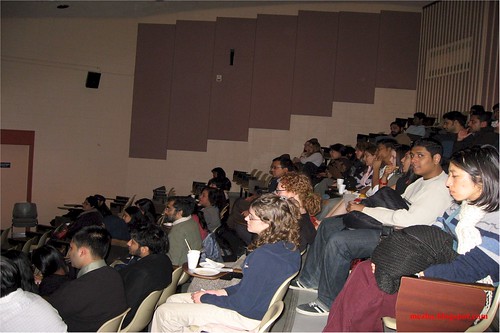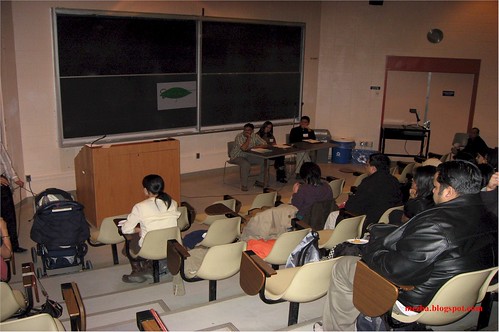I attended the
The documentary is a reenactment of the story of a few migrants who left

The movie started by having the camera talk to the common people on the street, be they students, couples on a date, a fuchka wala, a labourer, a rickshaw puller, a professor or a businessman. From everyone, you get the feeling that they are tied down by
It’s amazing that despite 30 years of independence and for all the talk of patriotism, given the chance half the country would bolt. They have in their mind an idealized version of life “abroad”, without any thought of the hardships they would have to endure. Given such a background, it wasn’t hard to fathom why our protagonists would decide to sell all their assets, borrow huge amounts of money and coax and beg to pay the smugglers to get them to Spain.
Their story starts at the
Halfway into the sea, after a grueling 16 hours of fighting the waves, the boat’s motor dies. Seven days later, still stuck in the middle of the
For me, one telling moment was when one of them, dying of hunger, points at a corpse of one who is already dead and suggests, “let’s eat him up.”
A normal person would reply, “What? It’s a corpse of our friend!”
Instead, we have our protagonist ask, “How? We don’t have knives to cut off the meat.”
After the movie was over, the question and answer provided a few light moments.

For example, with all the different issues and reasons raised in the movie about migrants, you would expect a few heavy questions. Rather, we had one lady ask, “These migrants, are they concerned about how their lives are going to effected if we don’t do something about the greenhouse gases?”
Well hello! These are people who don’t have a full day’s meal and you want them to think about the environment? Shobuj Shanti (Greenpeace) kothakar!
There was also someone taking into issue about why a particular scene was 6 seconds long rather than 10 seconds whereas “studies have proved that for a full impact of a motion picture scene it had to be 10 seconds long”. Something about shorter attention spans, or whatever. My attention span was shorter than the length of his question.
Of course someone got a little bit too excited and into the movie and decided we should use our knowledge of the TTC to help improve the bus service from Gulshan to Mirpur. Having used the TTC I think it is they who will need all the help they can get!
The movie had a couple of quotes that I remember. For example, this girl chides her friend, "You are ready to get up at 6 in the morning and work hard all day once you reach London, yet today in Bangladesh you stay in bed till noon and then decry nothing is getting done in Bangladesh! It's not the country's fault that you are lazy!"
There was another. The professor rants about how Bengalis tend to have an inferiority complex where anything good is foreign and anything bad is homegrown. He pointed at the example of a chilli we call Bombay Morich. It's big, spicy, expensive and so titled after Bombay. Where is it grown? Somewhere north of Borisal, Bangladesh.This same professor also asks "whose fault is it that people choose an uncertain death abroad over a certain life in Bangladesh".
Overall, it was a good and enriching experience. It made me think about certain issues and reconsider my black and white views of illegal immigration. It also made me realize how lucky I am to be in Canada when so many other people in the land of my birth say "it is not right for us to dream. For us, living is a nightmare". And then wonder in amazement at this same group of people who are so happy with so little, so content and so optimistic with nothing.

17 comments:
hmmmmmmmm interesting. Didja record it?
Em, hey bro your profile seems quite interesting, why don't you go get a blog of your own?
Yes the issue of movements of vast number of people accross the globe is a complex one. Not only do we have the problem of people from the third world moving to the first world but in the near future the movement of people from the third to the second world is also going to be a problem. Economics seem to be the factor which is trumping all other factors. Complex times ahead.
On an unrelated note, Mezba just have lost your unique name honor on the facebook. :P
Hey..I know this has got nothing to do with your post.
But Bangladesh was raped by Australia.
I'm SAD!
*cries*
I like when you blog about Bangladesh, it's so interesting to read about a place I don't know much about.
Thanks for writing the review that I planned to write like 3 months ago, but never managed! I loved the film, and after watching it I experienced one of those brilliant moments of insight. I realized that the question of human migration cannot be dissociated from the question of existence and meaning. I'll need to figure out this theory in greater elaboration, coz I seriously think it explains a lot.
BTW, I know the director -- since we do live in the same city. I'm glad the screening went well: last week I was giving him advice from personal experience on how not to get in trouble with border security on his way to Toronto!
Did you read today's Star?? The front page article was a conclusion that researchers came up with,
Wealth != Happiness
Was an interesting read. Good post again.
I thought those interviews with the regular folks from Dhaka were hilarious. Yes, it was a reality check.
You know, we should read that book, "Confessions of an Economic Hit Man". Will definitely help understand the situation in a broader perspective. It's a very good book!
anon, how can I record it? lol.. it was a movie screening.
saqi, the panel following the movie had a commentator who ranted about selective (he called it) discriminative immigration that Canada practiced. While I can understand where he was coming from, his solution of open borders is not one backed by me, our welfare system will then collapse. On the other hand, I disagree strongly with the lack of support Canada gives to new immigrants,not recognizing their degrees or having them requalify.
What is 'second world' btw?
Oh no about Facebook! I will look him/her(?) up.
Fatima, oh well, if we HAVE to lose in the super 8, might as well be against the Aussies.
Liya, I will blog more about Bangladesh some time soon. Thanx for the kind words.
Rawi, I look forward to reading your take on the movie, please do post on it! I think the movie should be used as a warning to would-be 'illegal' migrants.
Mango Addict, no I didn't! I searched for it but it wasn't there, do you have a link?
Squarecut, the best interviewee was the girl who spoke with a high pitch.. haha!
YES! And also, remember that puppet thing? Her father goes, "chele emerika te thake"...and she goes, "oooh, emerika!!" and then she was ready to dump her boyfriend or something.. I thought that part was hysterically funny.
Very well written and touchy post !!
Should send to Toronto Star or Globe and mail.
hey am I allowed to kid once in a while?
squarecut: i thought that puppet part was simply too good.
Mystic: thank you.
Anon: *bemused grin*
but mezba, i found the movie confusing in its message. did you realise that the 1st half kept conveying the message that the media propagates a false images of the "bidesh" and bangladeshis have a skewed view of life abroad [which is all true]. and then after we saw the section on the spanish tragedy, many interviewees said things like "but we should go abroad and bring back our skills"? isn't that contradictory?
i also didn't like how the director evaded answering questions. specifically ones like "what can i do" - he said something very evasive like "this is just a personal take on things, there is no definite message" - OF COURSE there's a clear message in your movie, why not come out and put it in words? i understand the panel portion of it wasn't long but seriously, he didn't directly respond to any of the questions.
Moonal, yes, I thought the ending enforced the belief that Bangladesh needs those who have gone abroad to come back to improve the country, the people "left" behind can't do it on their own - however much the director tried to wriggle out of it when cornered by Fariah, I think essentially he believes that expatriates should come back.
The director was very politically correct, in my opinion. He had made a good film, but any good film (or literary piece) has to have the guts to take stance on controversial issues, however unpopular it is amongst a certain group. Otherwise the film becomes more of a "warning: don't try to emigrate illegally" video.
As for my personal take, I think in some sense expatriates are needed back in Bangladesh. Only a guy who has seen how an efficient transit system worked abroad can come back and implement those changes. However, change is also needed in the attitude and education of the Bengali people, otherwise the conditions for advancement won't happen. The best example to follow is Bangalore, India. It's only education that has driven everyone forward. Literacy and education MUST be enforced on Bangladesh, it's the only tool to fight poverty and corruption.
yea i completely agree with 1) needing to take a firm stance on issues and 2) that while expatriates should go back to help implement things they've experienced abroad, something needs to be done WITHIN the country. we should discuss this more when we next see each other! :D
"but any good film (or literary piece) has to have the guts to take stance on controversial issues"
I disagree, coz this may not always be the case. In face of contesting narratives, or when reality is immensely complex and truth is evasive, a good piece is 'successful' in depicting precisely that. Art is not Rhetoric: the latter is weak without taking a stance, the former not necessarily.
Just came across this blogpost :-) Glad to see that people cared enough about the film to take the time to critique it. I am learning from all your comments and next time it will be better :-)
Post a Comment